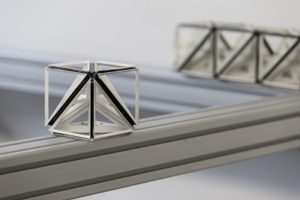
The AdditiveCARBON process for 3D printing of carbon fiber-reinforced composites is targeting application in aerospace and medical technology, among other areas
Germany company Cikoni has developed an additive manufacturing technology dubbed AdditiveCARBON that allows the realization of hybrid structures by means of a fully automated manufacturing approach in which the carbon fiber reinforcement directly follows the load paths and the additive base structure serves as support for compressive loading.
Composites play to their strengths when the load acts preferentially along the fiber direction.
While conventional additive manufacturing processes permit almost unlimited freedom of design, material properties are so far not comparable to the high load-bearing capacities of carbon fiber-reinforced plastic composites (CFRPs).
Cikoni aims to overcome this drawback with the AdditiveCARBON process.
Cikoni notes that traditionally in additive manufacturing, a larger building volume leads to higher production costs and longer production times.
On the other hand, in conventional composites production, tooling costs, inefficient material utilization and waste lead to high overall costs.
AdditiveCARBON is here to eliminate the limitations of both technologies by means of a targeted hybridization: the carbon fiber reinforcement reduces the necessary building volume of the 3D printing part and the additively manufactured base structure makes a separate tool unnecessary for the robot-supported 3D-winding process; a symbiosis, which has a positive impact not least on the cost side, note the firm.
The approach is particularly interesting where lightweight design requirements are combined with limited component production runs.
Cikoni envisages application of the AdditiveCARBON to fabricate customized prostheses and ultralight aircraft structures, with potential also having been identified in handling systems.
To ensure that the process can also be applied in cost-sensitive areas, Cikoni engineers have also developed a modular system combining hybridized injection-molded and metal components, from which larger structures can be quickly configured from modules.
“The holistic approach has already convinced numerous customers to rethink their view on lightweight design,” it notes.


